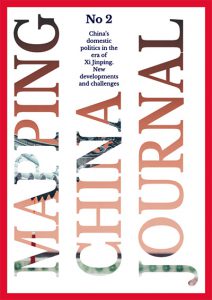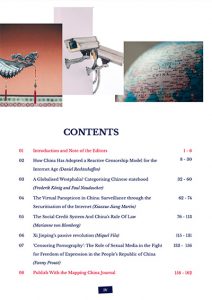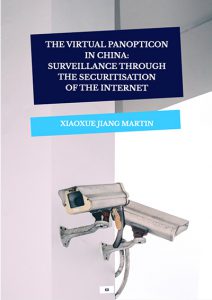MAPPING CHINA JOURNAL NO 2
China’s domestic politics in the era of Xi Jinping: New developments and challenges



The Content
Daniel Rechtschaffen analyses how and why China has changed its censorship strategies to be more reactive in the internet era by examining the inner workings and manipulation strategies of the Fifty Cent Party. Rechtschaffen demonstrates how they are used as an instrument of Chinese “disaster politics.” It draws on two primary sources—an in-depth interview with a Fifty Cent Party member and a series of leaked emails from the Zhanggong District Internet Information Office—and examines the responses of the Fifty Cent Party to two events, the 2015 Tianjin explosions and the 2013 Shanshan riots.
For an international perspective, Paul Naudascher and Frederik König are asking to what extent China conforms with the Westphalian state model, reaching the somewhat surprising conclusion that China is most globalized in its political dimension, yet less so in its economic one. China under Xi Jinping is therefore not yet as globalized as it could be.
Xiaoxue Jiang Martin takes on exploring CCP’s increasing control over cyberspace since 2013 and argues that by means of securitisation of the internet and cyberactivity, the Chinese government has created a virtual panopticon. To make this case, the Copenhagen School’s Securitisation Theory and Foucault’s concepts of panopticism and disciplinary power are applied to the CCP’s censorship and surveillance of the Chinese internet.
For a legal perspective, Marianne von Blomberg looks in depth at the Social Credit System (SCS) to answer the difficult question what the heavy impact of the SCS means for the rule of law in China. Von Blomberg points out that a nation-wide legal framework for the SCS has not been developed so far, resulting in a number of future challenges for legal and social management personnel in the PRC.
Another discursive perspective is offered in the essay of Miquel Vila, who is challenging the perception of Xi Jinping as a populist leader. Using the Gramscian concept of a “passive revolution” Vila explores how the political discourse under Xi has integrated already existing demands within Chinese society into the Chinese Dream as a new collective narrative, arriving at the conclusion that the purpose of the Xi administration is to prevent any populist uprising as a potential challenge to party leadership.
The research paper by Fanny Prouté offers a unique perspective on the freedom of expression in the PRC by examining the role and censorship of what is considered sexual media in the Chinese discourse. Therefore, Prouté argues that the targeting of material that is considered pornographic by censors serves as a placeholder strategy to silence critical political voices. Vice versa the author also shows how critical voices are using expressions of sexuality and nudity as an alternative form of political resistance in the PRC.
